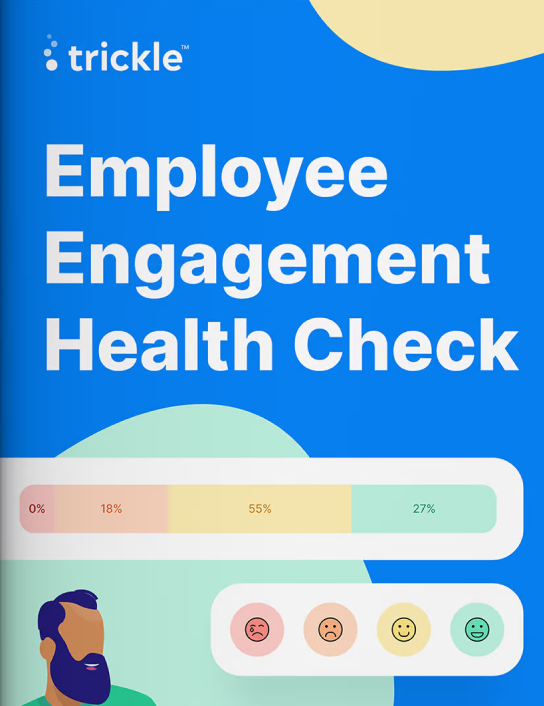How well does your company engage its employees?
Take your health check and find out.


Everyone likes to be noticed for a job they have done well, and a sincere thank you can often produce a positive effect.
Research has found that employees who feel appreciated and valued for the efforts are more productive, able to complete tasks better, and demonstrate a greater sense of belonging.[1]
Without this sincere appreciation or gratitude, particularly at work, people can quickly become demotivated and start to feel like their role is a “thankless job”.
Your people need to know that you really see and value their talents, accomplishments, effort and worth as a colleague.
Appreciation is about showing your people that they are a valued part of your operation and that they are significant to your business.
Giving real appreciation means going beyond just praising their wins and achievements, it means taking a more encompassing approach and showing your people that you really see, understand and care for them as a person.
Here are our top three tips on how you can actively make employee appreciation more meaningful in your organisation.
The lack of an organisation’s approach to employee appreciation can have the opposite effect, and is often due to a disconnect between management and employees over what each party constitutes appreciation.
If acts of employee appreciation, feedback, and praise become routinised or are too sporadic and impersonal, your people may view them as insincere and artificial.[2]
Similarly, highlighting a select few individuals via awards can smack of favouritism and leave the majority of your people feeling dejected, overlooked and unmotivated.
To make appreciation count requires a positive buy-in from leadership – this means consistently leading by example and championing this behaviour in others.
Doing so will send a strong signal to others that they should emulate this type of positive behaviour.
In turn, this will help spread a company culture of appreciation more quickly throughout your organisation.
Organisations can use a tool, like Trickle’s Fist Bump feature to achieve this. Fist Bumps are a quick way for your people to send individual praise that can be used by managers and others to offer peer-to-peer appreciation in a more personal way.
Managers should regularly take time for more social interactions, this can be as simple as a “good morning” or “how are you?”. By acknowledging your people and inviting them to share you are demonstrating to them that you “see them” and are actively seeking their input.
Small interactions like these are valuable connection points where you can engage with your people on a more personal level and keep you up-to date with what is going on within the organisation.
It is also a great way to build relationships with your people and to foster a sense of camaraderie, belonging and trust.
A 2019 study found that a strong sense of workplace belonging and inclusion leads to a 56% increase in job performance, a 50% reduction in turnover risk, and a 75% decrease in employee sick days.[3]
A survey by Glassdoor found that 53% of people said they would stay longer at their organisation if their manager showed them more appreciation, while another study revealed that 79% of people who left their jobs cited a lack of appreciation as their principal reason for leaving.[4]
Modern dynamic employee engagement platforms, like Trickle, are a streamlined way for managers to interact with their teams in real-time and to understand how people are doing.
Trickle brings together engagement, recognition and wellbeing in one place and enables managers to take a more proactive and consistent approach to how they interact with their people.
Ignoring or failing to actively listen to your people will have the opposite effect of showing appreciation.
This type of behaviour will make them feel invisible, disenfranchised, demotivated and disengaged from the organisation.
If you stifle your people’s voice or carelessly dismiss their feedback you are missing out on valuable real-time insights and opportunities to build trust with them, both of which can have a beneficial impact on your workforce strategy.
Actively listening to your people can help you understand what is going on at the grassroots level within the organisation and to pick up on potential issues before they become more serious problems.
Feeling appreciated is a very individual experience that is different for everyone and therefore there is no single way an organisation can express it.
If organisations take a blanket approach to making their people feel valued or are overly focused on outcomes, they are limiting their impact and thus the effectiveness of their strategy.
Only by actively engaging with their people and taking a more holistic approach can management show genuine employee appreciation that will have a lasting impact on their people.
Trickle facilitates regular check ins with staff but also enables staff to have a voice and contribute so it’s an open two-way conversation.
Trickle can help facilitate regular check-ins, give your people a voice, and enable open two-way conversation.
If you would like to see any of Trickle’s real-time engagement, wellbeing and recognition tools, please get in touch with us to arrange a demo.
[1] https://www2.deloitte.com/us/en/insights/focus/human-capital-trends/2020/creating-a-culture-of-belonging.html
[2] https://hbr.org/2020/01/the-little-things-that-make-employees-feel-appreciated?registration=success
[3] https://www.betterup.com/en-us/resources/webinars/the-value-of-belonging-at-work-the-business-case-for-investing-in-workplace-inclusion
[4] https://www.forbes.com/sites/davidsturt/2018/03/08/10-shocking-workplace-stats-you-need-to-know/#2ebd9d05f3af